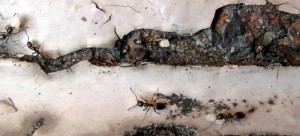"Does evolution explain human nature?" This is a typical Templeton Foundation question, in that it is laden with ambiguities. Only when one figures out the meaning of "evolution," "explain," and "human nature" can one really get to work.
I suspect that the Templeton questions are drafted vaguely in order to invite a wide range of participants, who must often roll up their sleeves to define the component elements of the question as part of their answer.
I don't mean to sound like a pedant here. The reason I am posting on this question is that despite the wobbly question, Templeton has once again done a good job of assembling a wide range of opinion on an important set of issues. You can read the many responses here. My favorites are
Frans de Waal,
If we look at our species without letting ourselves be blinded by the technological advances of the last few millennia, we see a creature of flesh and blood with a brain that, albeit three times larger than that of a chimpanzee, does not contain any new parts. Our intellect may be superior, but we have no basic wants or needs that cannot also be observed in our close relatives . . .
Lynn Margulis
[R]eligion serves an obvious evolutionary function: it identifies, unifies, and preserves adherents. Admonitions to desist from the seven deadly sins inhibit behaviors that threaten group solidarity and survival. Greed, for example, privileges the individual in seasons of limited resources. Lust - the biblical coveting of the neighbor’s wife (in its male-centered perspective) - interferes with ideals for the nurture of healthy children and effective warriors. Prohibiting sloth enhances productive work intrinsic to survival and reproduction of the social unit. Anger, perhaps useful in battle, destroys family and other social relationships. Envy and pride promote individual interests above those of the larger social unit. The survival value of prohibiting sin seems obvious . . .
I disagree with neo-Darwinist zoologists who assert that the accumulation of random genetic mutations is the major source of evolutionary novelty. More important is symbiogenesis, the evolution of new species from the coming together of members of different species. Symbiogenesis is the behavioral, physiological, and genetic fusion of different kinds of being; it leads to the evolution of chimeric new ones.
Geoffrey Miller
My own research has been inspired mostly by good-genes sexual selection theory (the idea that animals choose their partners based on cues about genetic quality) and costly-signalling theory (the idea that only animals in good condition can afford seemingly pointless displays like extravagant plumage). These theories have proved enormously useful in understanding a range of human behaviors that have seemed to have no clear survival payoffs, like music, dance, art, humor, verbal creativity, conspicuous consumption, and altruism.
Robert Wright
What Darwinism tells us is how natural selection gave human life its distinctively rich texture of meaning. Darwinism can also give us guidance as we try to better ourselves and make that meaning richer still. What Darwinism does not tell us is why there is meaning at all.
David Sloan Wilson
Genes are only one mechanism of inheritance. Some immunological, psychological, and cultural processes also count as evolutionary. They too rely on the open-ended variation and selective retention of traits, but they are based on non-genetic inheritance mechanisms. People and cultures shaped by these fast-paced evolutionary processes no longer have the same "nature," any more than two bacterial strains that have diverged by genetic evolution. In this fashion, my simple and seemingly boring formula can be understood to say that humanity as a whole does not have a single "nature." Instead, each and every person and culture has its own "nature."
There's lots more to read (by these authors and others) at the above link








